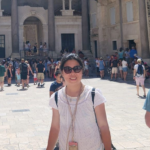
Since then I’ve seen Alagna in just about every role he’s sung in New York, and he’s had his vocal ups and downs but he’s never disappointed me in the sense that he’s always given a committed, passionate performance. He’s also never cancelled on me. It’s just topping on the cake that he is one of those people who seems to genuinely love to sing and be onstage.
So this afternoon’s performance of Andrea Chenier (at Avery Fisher Hall, probably one of the worst halls for any kind of vocal singing) made me wonder whatever happened to Bobby.
The Roberto Alagna who showed up for today’s performance seemed ill-at-ease from his very entrance and never settled into the performance. He fidgeted nervously and his hands shook as he flipped the pages of his score. Right before his big entrance aria “Un di all’azzurro spazio” he got so out of sync with the conductor that he signaled for the conductor to stop completely. Singer and conductor talked for a moment before deciding to re-do the entire lead-up to the aria.
When he sang, he sounded fine, if a bit underpowered. At times he seemed to signal to the conductor to lower the orchestral volume. He didn’t really seem to know the role — surprising, considering it’s a very well-known role. But he completely missed the big blaring climaxes, the poetic sweep. It honestly looked like he was sight-reading.
Disaster happened again in Act Two. He completely missed his entrance and the bars of orchestra played in the background as he rushed onstage and the other singers exchanged awkward glances. Again, more fidgeting, he started drinking from a water bottle and then wiping his nose, and the whole time he had a worried, tense look on his face.
By the fourth act Alagna had a grim “let’s just get this over with” expression. His voice didn’t crack, the timbre was basically healthy, but again, he was almost marking certain points in the score, including the final duet “Vicino a te” and in a role that requires a good bit of tenor bravado, it was all very anti-climactic. He got a few boos during the curtain calls, and looked very unhappy. This was a very disappointing performance from him.
Kristin Lewis (Maddalena) has an attractive, high-placed lyric soprano voice with a secure top. The slightly smoky timbre and bell-like upper register reminded me a little of Leontyne Price. She doesn’t have the lower register for “La mamma morta” to make its full impact, and her rather mushy diction didn’t help. She was also singing a bit like a conservatory student—very prim, very lady-like, hands held together, and doesn’t really have the verismo style yet. But still, this is an attractive lady with an attractive voice and I look forward to hearing more of her in the future.
George Petean (Gerard) was the savior of the afternoon. A quick look at the provided biography shows that he’s been around for quite a few years without having broken into baritone-stardom. Maybe this performance will make the phones start ringing, because he displayed a velvety, secure baritone voice and brought some much-needed passion to the performance. “Nemico della patria” was outstanding and earned a noisy ovation. He was the only cast member to be awarded a standing ovation at the end of the performance.
The lesser roles were all professional. Rosalind Elias made a brief cameo as Madelon. She sounded somewhat croaky, but she was one of the few singers who seemed to realize that even though this is a concert opera, it’s acceptable to add a dash of theatricality to the performance. She hobbled onstage and offstage dramatically and was dressed in a black head-wrapping shawl.
Alberto Veronesi is very entertaining to watch, with his huge conductor mane and Lenny Bernstein-like jumping on the podium. He made Giordano’s score sound like movie music, full of bombast and ringing crescendos (accompanied by the requisite hand-vibrations). But his coordination with his singers was poor, and he knew two dyamics: loud and louder. It would have been nice had he toned down the orchestra when it was so obvious that Alagna was struggling. Oh well.
Let’s hope the next OONY performance is better.



